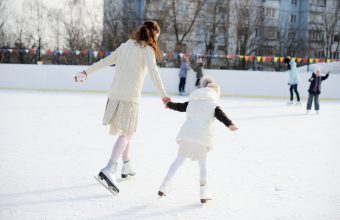Our latest TV ad features NHL superstar and dad Vincent Lecavalier playing ‘tightrope walking’ with his daughter Victoria and some of her friends. The ad highlights the fact that it’s easy, fun and critical for parents to play with their kids in a way so they learn fundamental physical skills.
As simple as the ad is, it actually challenges common beliefs on raising active and successful kids.
There are three common myths that we want to debunk:
Myth 1: Kids will learn all the skills they need on their own
Kids play. That’s what they do. But playing is more than just fun; play is critical to your kid’s entire development.
Play is so important that the United Nations has recognized play as a fundamental right of children. The UN statement is in recognition of the research that shows kids need play to grow physically, intellectually, socially and emotionally.
But parents are not necessarily aware that kids need to play a variety of games to develop the physical literacy skills they need to achieve their full potential.
Our recommendation:
It’s great to spend time playing games with your children. As you play with them, why not play fun games that will also help your child learn fundamental skills that will help them in all aspects of life?
Myth 2: Teachers and coaches will teach my kids the skills they need to know
So that we can deliver to you what you need, we’re always talking with parents like you. Parents have told us that helping their kids succeed is important. Along the way, they feel that their main responsibility is to make sure their kids succeed academically. It’s not that parents don’t understand the importance of physical activity, but they assume that coaches and teachers will teach their kids the physical skills they need.
In reality, parents are and remain their kid’s first teachers, and this applies to physical skills as much as academic skills. And you can’t start too early. From birth to age 6, children need to develop the ABCs of movement’agility, balance, coordination, speed’by playing a diversity of fun games every day.
Our recommendation:
Realize that you are your child’s first teacher of all skills, especially the physical skills. By teaching, we mean exposing your child to many fun games. Don’t be afraid if you are not sporty yourself. It’s not about turning your kid into an Olympian; it’s about teaching good skills and active habits early in life. Get to know the fundamental skills for your kid’s age and just play!
Myth 3: It’s for jocks only, my kid is not an athlete
In our last editorial we stated that there are no natural-born athletes. This generated many comments. It has raised the old nature versus nurture debate, but there’s not much to argue in view of the new research. There is simply a lot of science that now demonstrates that our brain is not static, and that what we do actually changes the structure of our brain.
In other words, the brain we are born with will adapt and evolve according to what we do and the skills we practice. Two video clips, one from Daniel Coyle author of The Talent Code and one from Matthew Syed who wrote Bounce: How Champions Are Made present simple summaries of the research.
Based on the science, our contributor Sara Smeaton, who calls herself a ‘non-sporty mom,’ told me that she has changed her entire outlook on what could be possible for her kids. ‘I always thought that my kids would never be athletic. I was resigned to the fact that they would be un-athletic like my husband and I,’ she said.
Our recommendation:
Don’t fall into the old clichés of sporty versus non-sporty or athletic versus non-athletic. Instead, look at physical literacy as a way to help your children develop as well-rounded people. In the end, our body is our window to the world. Whether your children become artists, business moguls or professional athletes, their bodies will be their main tools for expressing themselves and for relating to the world around them.
The winning formula
The formula is simple: Play with your children, and play fun games that will help them to develop fundamental movement skills. With new skills, your children’s confidence will improve. With skills and confidence, their level of enjoyment will grow. In the end, having more fun in activity will mean your kids might become active for life!
Richard Monette is the publisher and editor-in-chief of Active for Life. He’s a ‘renaissance man’ of the quest for achievement and fulfillment. His professional activities span the disciplines of business, sport psychology and education. He is part of the B2ten leadership team and leads the Active for Life initiative. Richard is married and the the proud ‘papa’ of a 9 year-old boy and an 11 year-old girl.
Tagged under: Parenting,active for life,active kids,successful kids
Category: parenting






